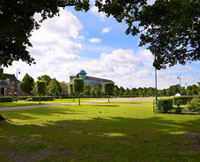 We are experiencing an amenity arms race, with facilities in residential developments becoming more and more elaborate. At the same time, balancing everybody’s needs is becoming more challenging, as tenure types expand and expectations rise.
We are experiencing an amenity arms race, with facilities in residential developments becoming more and more elaborate. At the same time, balancing everybody’s needs is becoming more challenging, as tenure types expand and expectations rise.
Creating mixed-tenure communities with amenities and services that are even-handed is a challenge. Planners are being more demanding regarding shared amenity space for all tenures while challenging the service charge costs for affordability. So what do we do?
A recent study by the University of Oxford identified that people who live near a pub are “significantly happier” than those who don’t. Some may wonder why it took a university study to come to that conclusion, but what it showed was that people benefit from face-to-face social interaction and a sense of community. In an age when technology is reducing face-to-face interaction, it is reassuring that a physical meeting place is still valued.
Businesses too have recognised the benefits of more social interaction and improved performance when workers feel part of a wider network of co-workers.
Co-working spaces have very quickly become aspirational because they enable users to feel part of wider community of workers. They have enlivened previously empty office buildings and encouraged small businesses to work together.
So how should residential developers be responding to these trends, learning from them to deliver places that satisfy the needs for people to interact and create successful communities?
Sometimes it can be expensive. In some respects, changes in residential development, with the provision of more elaborate private amenity spaces, has been the cause of the much-criticised “poor door”, highlighting the “them and us” approach to design.
Segregated design has been driven by financial realities, because providing extensive amenities is prohibitively expensive for the intermediate and affordable tenures.
So if the “arms race” is curtailed by affordability, we need to recognise the importance of a thriving public realm, commercial and retail spaces that can offer a sense of community and belonging.
The prime minister announced recently that the government was investing £150m in the regeneration of existing estates. The new advisory panel, led by Lord Heseltine, will be considering what people value and how to create successful spaces and places.
Hopefully, Heseltine watched The Real Marigold Hotel, a recent TV programme which explored how older people would choose to live. It put together a group of older celebrities in India and considered whether they would want to retire there. The programme was intelligent and thought-provoking, questioning why we choose to live where we do.
It highlighted that despite living in an alien environment people could very quickly adapt and feel at home because they had access to amenities and services that were important to them, such as help with household chores and good-quality and affordable healthcare, as well as a sense of living independently but also as part of a community.
Activities such as yoga and meditation were valued, even by those who had no interest in them before they arrived in India, and very quickly a link to the broader community was established through these activities.
The priorities for these older celebrities did reflect their age and time in life, but also highlighted the importance of understanding what really makes a place “home” and how little time we spend trying to understand what is important to each of our customer groups.
So perhaps we need to take a step back and look more broadly at what we consider a community amenity to be.
The best residential developers work hard to deliver active public spaces which attract interesting retail and commercial occupiers that engage with the local community. However, there are still too many new places where the ground-floor spaces remain empty or lacklustre.
The success of the regenerated estates will not only require a genuine mix of uses and tenures unconstrained by pointless planning rules, but amenity spaces and services that are engaging and affordable. And, of course, a pub.
Debra Yudolph is a partner at SAY Property Consulting










